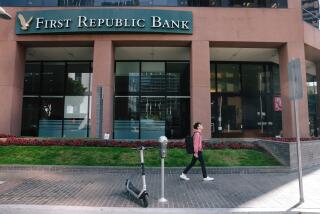Freddie ramping up securities purchases
- Share via
Freddie Mac increased its support for the nation’s ailing home loan market in October, in part playing the role the government had in mind when it seized the mortgage loan giant.
The company and its bigger sibling, Fannie Mae, are vital cogs in the nation’s mortgage market, buying loans from lenders, insuring them against default and supplying fresh cash to make more loans.
Some of these loans are sold to investors; others are kept by Fannie and Freddie. But under severe financial pressure last summer, Freddie, and to a lesser extent Fannie, pulled back from its purchases of pools of home loans known as mortgage-backed securities.
But the company said Monday that it bought $27 billion in mortgage-backed securities in October, increasing its portfolio at an annual rate of 44%. The company’s portfolio now stands at $764 billion and it may grow to $850 billion by the end of next year under the government’s plan.
The purchases by Freddie -- and Fannie, which hasn’t released its October data yet -- may have kept mortgage rates from skyrocketing amid the credit crisis. But they haven’t reduced them, one of the goals of the government takeover.
One reason: The companies’ debt costs -- what they pay for the money they borrow to buy mortgage-backed securities -- have been rising. Those higher costs are passed on to borrowers.
“Freddie accelerated around corners last month to rebuild its balance sheet in a major catch-up move,” Jim Vogel, an analyst at FTN Financial, wrote in a research note. “That it could do this . . . in a tough market is a minor positive for the mortgage market.”
However, there were a few warning signs. Freddie’s business of pooling mortgage loans, guaranteeing them and selling them to investors contracted slightly last month -- the first time that’s happened in years. This business is much larger than its portfolio business, suggesting that lenders are making fewer home loans and private investors are growing more reluctant to buy mortgage-backed securities.
Freddie also shifted dramatically toward using short-term debt to fund its operations, issuing $58 billion. Freddie has not been able to issue much long-term debt, as doubts about its future and chaos in the credit market make investors reluctant to lend it money for longer than one year.
Analysts said short-term debt must constantly be repaid and exposed Freddie to risks, such as wide fluctuations in interest rates that might make it difficult to raise new funding as some debt matures.
Delinquencies on loans guaranteed by Freddie Mac also accelerated in October, rising to 1.34% from 1.22% in September.
Freddie Mac and Fannie Mae have been operating under the control of the government, which took over the mortgage giants in September as the companies teetered on the brink of failure.
Since the takeover, regulators have instructed the two firms to buy more mortgages to bolster the home loan market.
The government’s plan called for buying as much as $200 billion of special stock in the companies.
More to Read
Inside the business of entertainment
The Wide Shot brings you news, analysis and insights on everything from streaming wars to production — and what it all means for the future.
You may occasionally receive promotional content from the Los Angeles Times.










